ARTICLE AD BOX
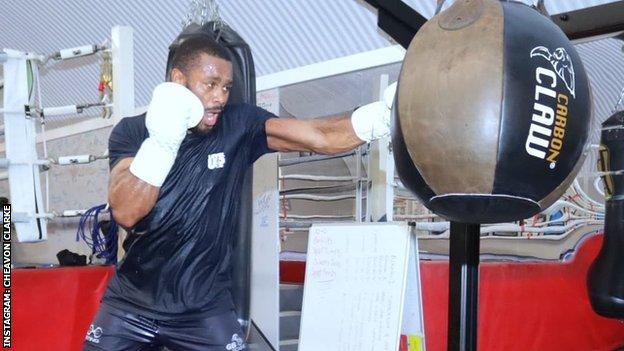 Cheavon Clarke has signed with Matchroom Boxing and will make his debut at the O2 Arena in London on Sunday
Cheavon Clarke has signed with Matchroom Boxing and will make his debut at the O2 Arena in London on Sunday| Venue: O2 Arena, London Date: Sunday, 27 February |
| Coverage: Commentary on BBC Radio 5 Live from 21:00 GMT; text commentary on the BBC Sport website & app. |
Before the phrase was popular, Cheavon Clarke was talking about "levelling up". It was how he got started in boxing.
Clarke was trying to raise his game as a footballer when he joined an amateur boxing club, aged 18.
"My ethos is to level up," he says. "I used to play football and I played at a decent level, a reasonable level. I could hold my own. I just wanted to get fitter so I could go a little bit harder than everybody else because I'm always trying to level up.
"That's how it happened. It wasn't like I planned to go with boxing. It was just by accident."
But after a first session together, Clarke was taken aside by Jason Weeks, one of his amateur trainers.
"He goes, 'You're really good you are. You could be a world champion,'" Clarke remembers. "In my head I was thinking this guy's chatting garbage. He could see something I couldn't.
"Jason was the actual coach that made me think, 'Oh yeah, I could be something.'"
Moving on from Olympic disappointment
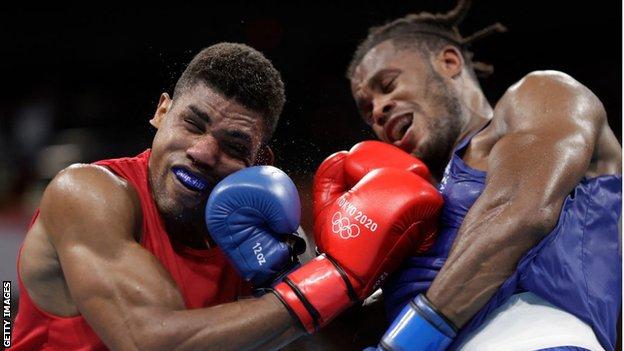 Cheavon Clarke (right) was beaten by Brazil's Abner Teixeira in the round of 16 at the Tokyo Olympics
Cheavon Clarke (right) was beaten by Brazil's Abner Teixeira in the round of 16 at the Tokyo OlympicsNow 31, Clarke has been a two-time national amateur champion and a Tokyo Olympian. On Sunday, he faces his first professional bout, at London's O2 Arena - taking on Croatia's Tony Visic as part of a card topped by Lawrence Okolie's cruiserweight world title defence against Michal Cieslak.
"I could tell you that I never had an idea about boxing, all of the whole Matchroom [his promoter] and all the other people that play a part in boxing," he says.
"That's all just recent. I never had a dream of going to the Olympics, I never had a dream of being a boxer -it's all become a part of the journey."
Clarke competed at the 2014 Commonwealth Games for Jamaica, where he was born, but suffered disappointment in Glasgow, going out in the first round. He drifted from the sport. Weeks and Lenny Trust, his coaches at the Gravesham club, brought him back.
He first won the English Elite title in 2016, beating Chris Billam Smith, now the European cruiserweight champion, in the final.
He switched to competing for Great Britain - having lived in the country since the age of 10 - and started to make a name for himself on the international circuit. At 91kg, he took on some of the best amateur heavyweights around - the towering Russian pair of Evgeny Tishchenko, an Olympic gold medallist, and Muslim Gadzhimagomedov, a world champion and Olympic silver medallist, as well as Erislandy Savon, the Cuban who gave Anthony Joshua such problems at London 2012.
"And I haven't been outclassed by any of them," Clarke points out. "None of them."
He took silver at the 2017 Europeans, a bronze at the 2018 Commonwealths and qualified for the delayed Tokyo 2020 Games.
The Olympics might not have been his original dream, but he was utterly determined to succeed. He focused on one thing: "Medal and medal only."
"That's all that mattered," he adds. "No disrespect to anybody, I've said it already, but I'm not about this thing of just taking part. No, sorry, that's not my standard."
That made it so much harder to tolerate another first-round defeat, losing in Japan to Brazilian Abner Teixeira. His time in Tokyo, his part in the Team GB experience ended all too abruptly.
The restrictions of the pandemic meant that after that split decision defeat, he had 48 hours to vacate the athletes' village and fly home alone, without a medal in his pocket.
"It was the best worst experience of your life," he says. "But I've accepted it. That's the main thing. I've moved on from it now. So the level up continues."
Cheating death twice
If Clarke's characteristic exuberance was shaken, it was temporary. He is nothing if not resilient. After all, he has almost died. Twice.
He was just six years old the first time he was told he'd flatlined. He'd fallen from his house in Jamaica and was impaled on a metal spike.
"It's very vague," Cheavon says of those memories. "I remember having that colostomy bag by my side. That was pretty interesting."
Clarke was older the next time. Not long after he'd taken up amateur boxing, he had what he thought was a stomach ache.
"This pain was killing me," he says . "I can't tell you. This pain was hard. If you've ever had appendix problems, you would know. I just put it off. I put it off and put it off and was just drinking ginger tea... it didn't work."
Having tried and failed to find some antacid pain relief, after collapsing on his stairs, eventually he was taken to hospital.
He remembers: "You walk into the desk at A&E and the lady, I'll never forget, she went, 'The wait is five hours.' I went, 'Take me home.' I was going up the steps again and, no word of a lie, I got to the middle of the steps this time and I just kind of like dropped."
An ambulance, blue lights flashing, sped him back to hospital. There was no five-hour wait this time. That's when he knew it was bad.
"I just remember it being hella cold," he said. A white cup to take a couple of tablets was the last thing he saw before he lost consciousness.
The next time he opened his eyes, he noticed the sunshine. "The doctor came up," Cheavon recalls. "He goes, 'Mr. Clarke, you're a very lucky man. We had to do everything we could to save your life.' Because my appendix had erupted. When it explodes, you're meant to be poisoned and die."
That was close enough. "I feel like John McClane from Die Hard: 'Still alive!'" he adds cheerfully.
"I think the third time, I won't be so lucky."

 2 years ago
23
2 years ago
23
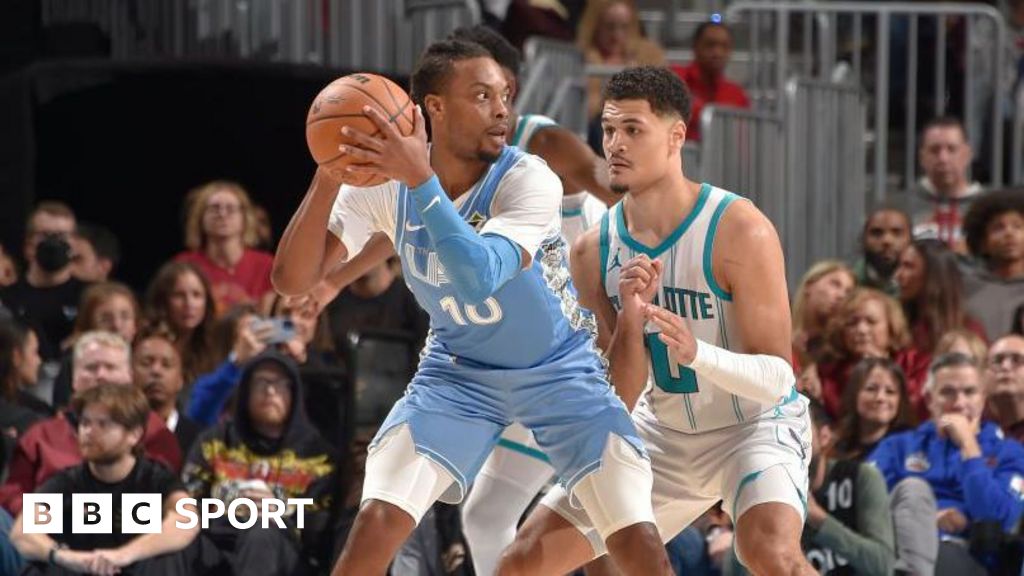
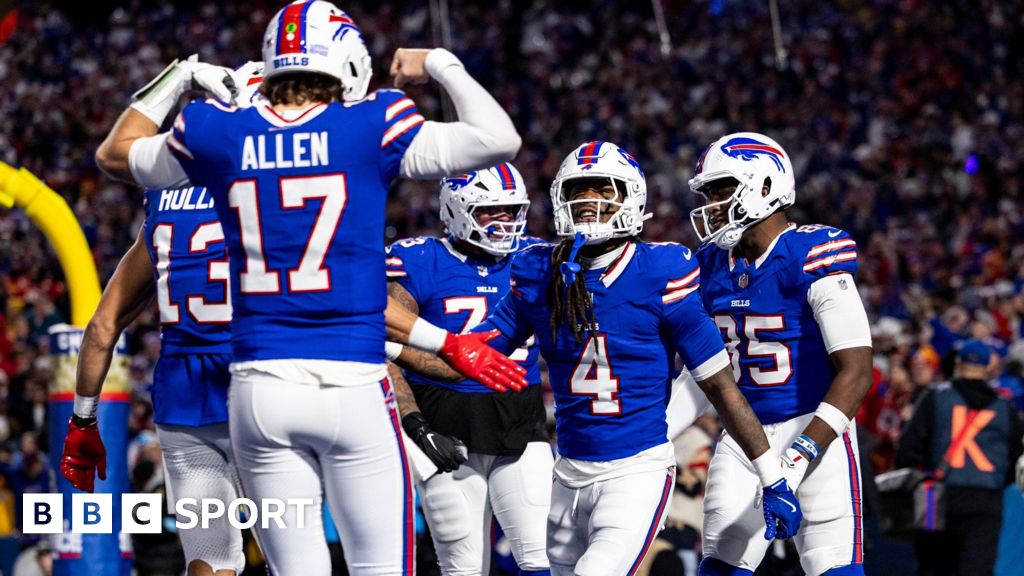
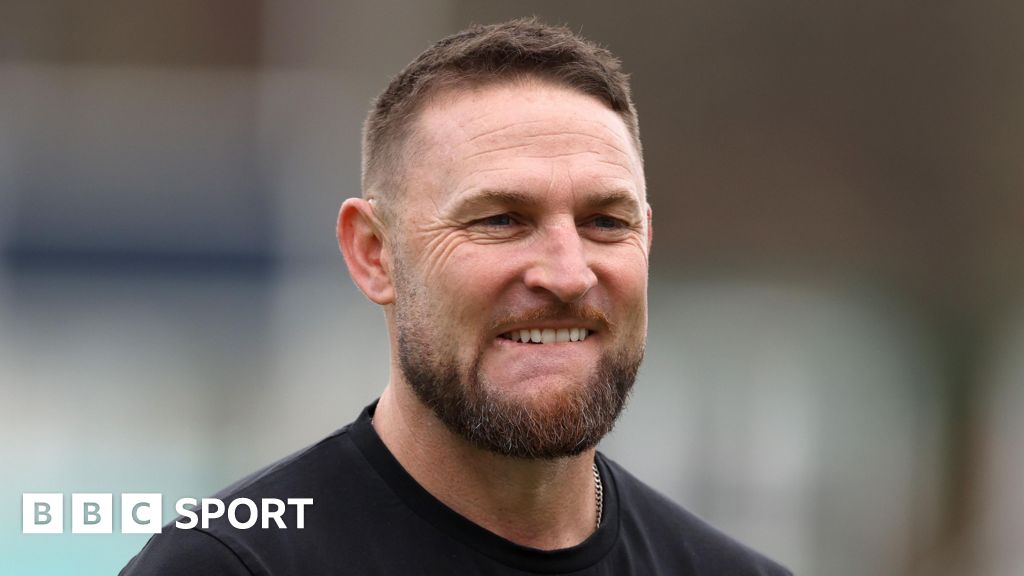





 English (US)
English (US)